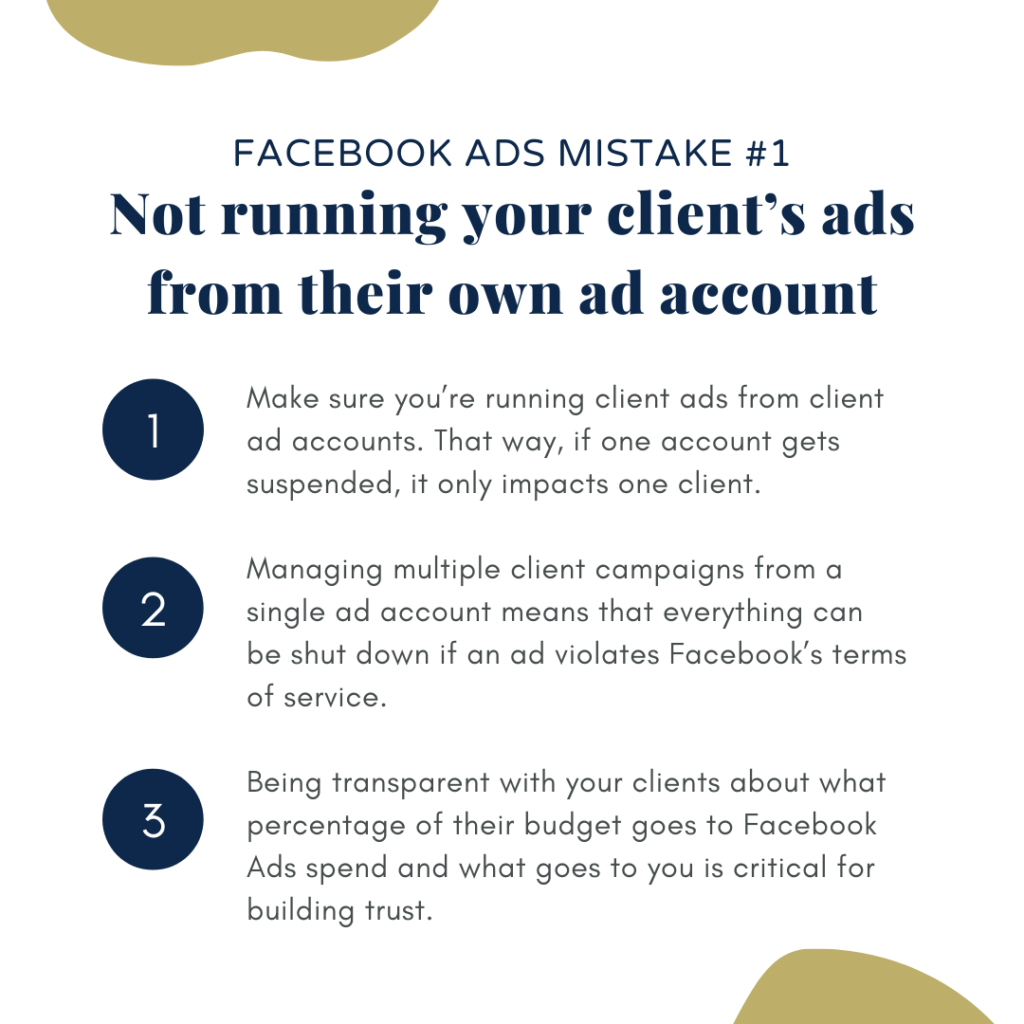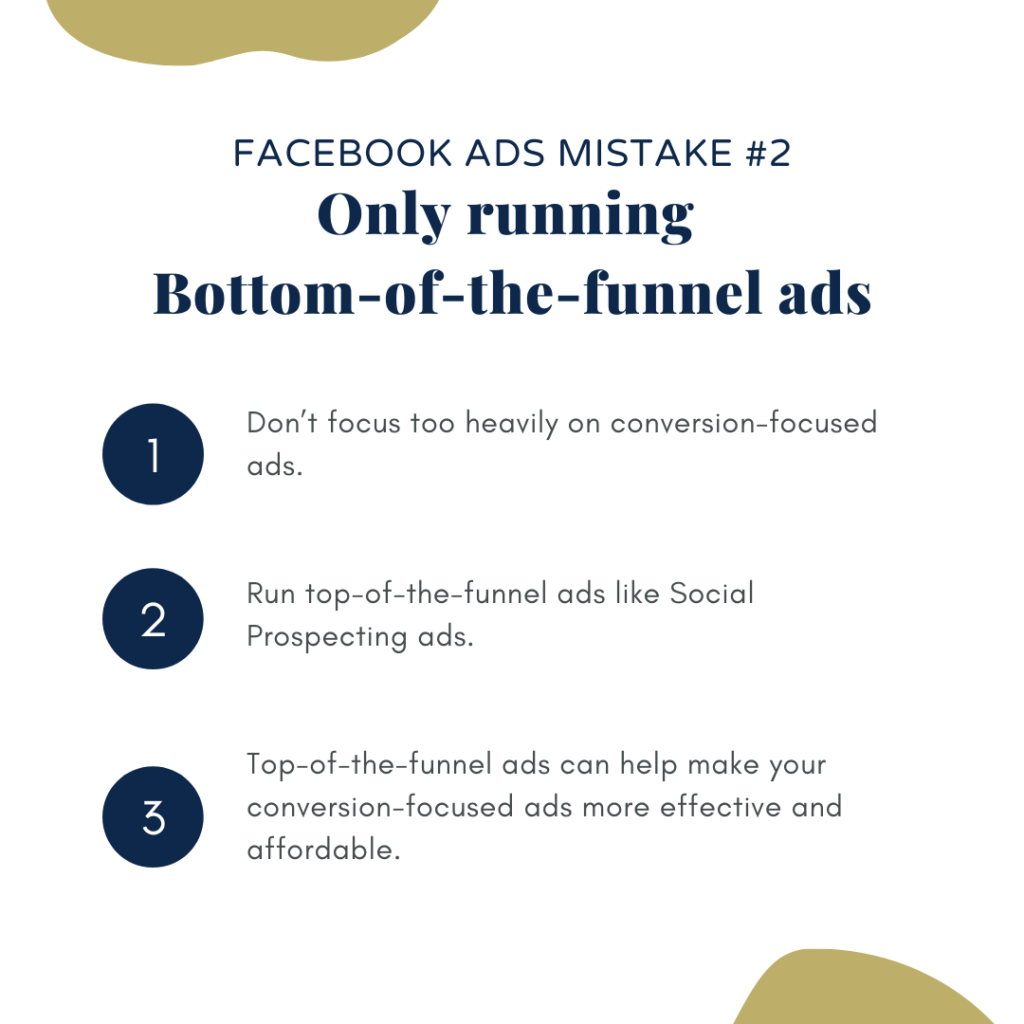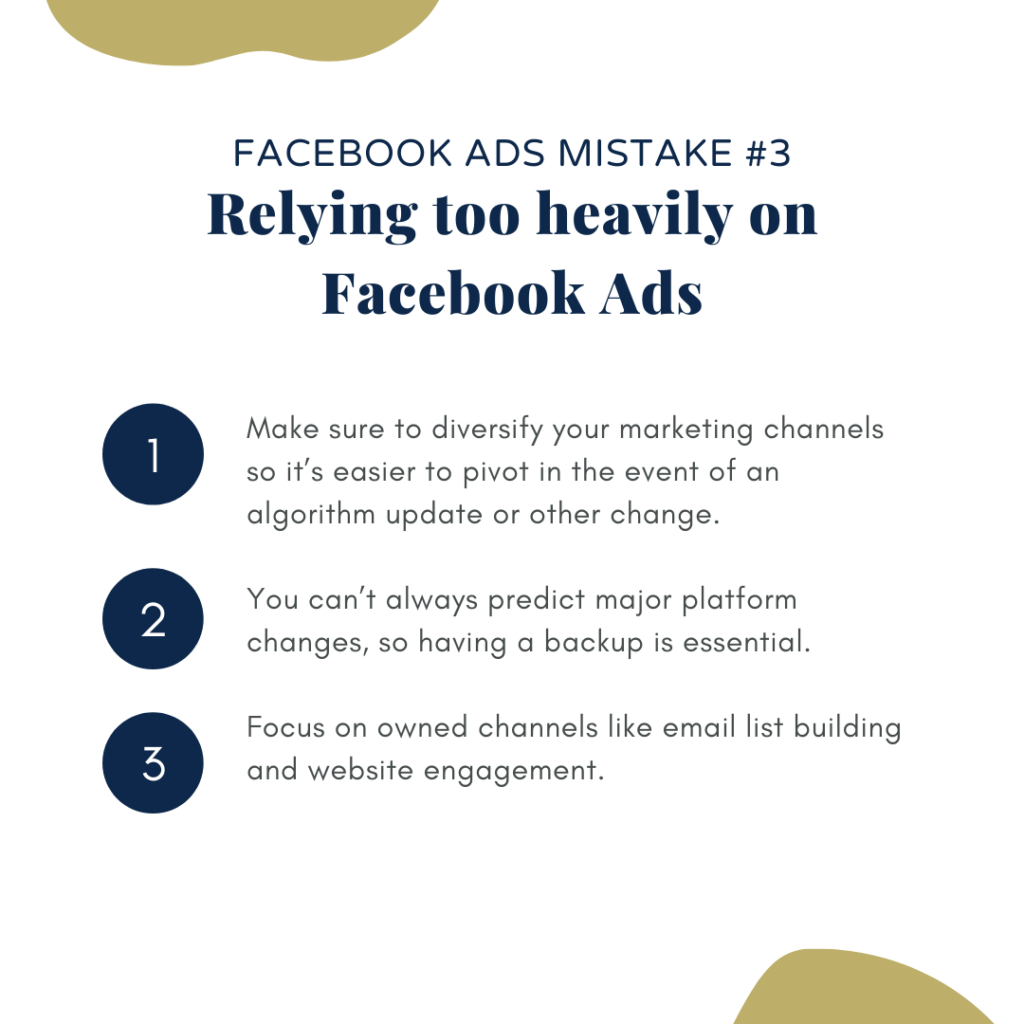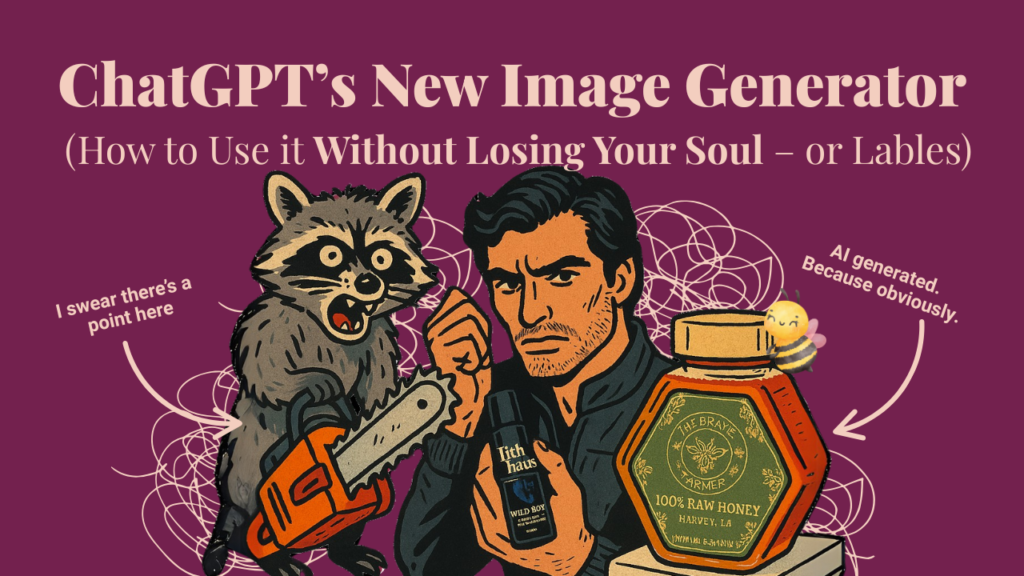Are you running Facebook ads for your clients? If you are, good for you. It’s a fantastic way to help your clients reach their audience! But, you might want to take a few minutes to make sure you’re not making one of these 3 big mistakes that I see so many agencies and marketers make.
Today I’m walking you through the 3 most common mistakes I come across when I’m consulting with agencies on their Facebook ads fulfillment processes for their clients. Not only are these mistakes potentially hurting your campaign’s performance, but they could also be setting you up for some seriously uncomfortable conversations with your clients down the road, and even leave you in the dreaded Facebook Jail.
Mistake #1: Not running your client’s ads from their own ad account
I see this a lot with new agencies and marketers. And I mean a lot. If you’re running your client’s Facebook ads campaigns from your own ad account, you could be setting yourself up for a big mess down the road.
The ad account that ads are created in is held responsible for the content of the ads themselves. If something violates one too many Facebook policies, your entire ad account can– and will– get shut down. Even worse, if you’re running ads for multiple clients from that one single account, that means all of your client campaigns will come to a screeching halt as well, even though they had nothing to do with the offending ad.
And yes, that means your own ads will stop as well.
Not only that, but it can take a long time to get a disabled account reinstated, and what’s worse–it’s not always possible. You could even wind up having a hard time creating a new account to run your ads from down the road.
Believe me, it creates a big mess, and if you think you’re not at risk of getting thrown into Facebook jail because all of your clients are angels, think again. Your client could be Mother Theresa and they’d still be at risk of having their ad account disabled or suspended.
While it can take a little doing and some patient communication with your clients, it is much better to walk them through giving you access to their existing ad account or helping them to create a new one if they don’t already have one.
But Lexi, that means they’ll be able to see their ad spend! You say
You’re exactly right, and that’s also kind of the point. Even though it can feel scary to have your clients come face-to-face with what you’re charging for managing their ad account, being transparent about what’s ad spend and what’s management fee can go a long way towards building trust with your client, and help them feel respected.
So it’s a win-win, really.

Key takeaways:
- Make sure you’re running client ads from client ad accounts. That way, if one account gets suspended, it only impacts one client.
- Managing multiple client campaigns from a single ad account means that everything can be shut down if an ad violates Facebook’s terms of service.
- Being transparent with your clients about what percentage of their budget goes to Facebook Ads spend and what goes to you is critical for building trust.
Mistake #2: Only running Bottom-of-the-funnel ads
Look, everyone wants conversions. Everyone wants the list sign up, the purchase, etc. But if you’re working with a fresh ad account without a lot of historical data or an established audience, you’ll have a tough time running a lead generation or conversion campaign right from the get-go, at least not without a pretty high cost-per-lead.
But it can be hard to talk to clients about the importance of dedicating some of their advertising spend to top-of-the-funnel campaigns. It’s harder for them to make the connection between that money they’re spending, and acquiring new customers.
Fortunately, I use a really affordable campaign strategy to target the top of the funnel, all while improving the performance of mid and bottom-funnel campaigns. It’s called Social Prospecting, and I’ll be breaking down exactly how to set up one of these campaigns next week. Make sure to subscribe to the blog so you don’t miss it.
In a nutshell, it involves getting your client’s brand in front of a ton of people and giving those people an opportunity to identify themselves as a member of your client’s ideal audience. You then use that newly identified audience to improve the performance of your more conversion-focused campaigns.

Key takeaways:
- Don’t focus too heavily on conversion-focused ads.
- Run top-of-the-funnel ads like Social Prospecting ads.
- Top-of-the-funnel ads can help make your conversion-focused ads more effective and affordable.
Mistake #3: Relying too heavily on Facebook Ads
This is a BIG one, and I feel like I’m lecturing my clients on this all the time.
Picture this. It’s November of 2020, and you’re preparing to launch end-of-year fundraising ads for your nonprofit clients. It’s been a tough year thanks to the pandemic, and this nonprofit could really use a strong giving season. In past years, these end-of-year campaigns helped your nonprofit client hit their targets. There’s no reason to think that won’t happen again, right?
Right?
Wrong. It’s November 2020, which means it’s also election season in the US. Yeah, we all know what a circus that was.
But beyond all the hype and drama, there’s also the issue of Facebook ads reportedly being used to divide us all around hot-button issues. Enter our friend Zuckerberg, who just wants to make the world a better place
(Maybe?)
Well, what does he do? He shuts down any and all ads that are even remotely related to social issues or the election. And that includes your client.
But they’re promoting equity in education?! You say. Surely that’s something we can all get behind, right? That’s not divisive!
I hear you. But, unfortunately, the Facebook bots disagreed. And since that nonprofit’s fundraising strategy hinged on a Facebook ad campaign that had historically performed well, they were in a really tight spot.
The moral of that story is that it’s essential to diversify your marketing platforms. Just because one is working for you doesn’t mean it will be the only one that works for you, or that it will continue working for you in the way you expect it to.
Like any social channel, the proverbial rug can be pulled out from under you at practically any time. You don’t own the channel, and you certainly don’t control the algorithm. One little change, and if your marketing strategy hinged on Facebook, you could be facing some really difficult conversations with your clients.

Key Takeaways:
- Make sure to diversify your marketing channels so it’s easier to pivot in the event of an algorithm update or other change.
- You can’t always predict major platform changes, so having a backup is essential.
- Focus on owned channels like email list building and website engagement.
Are Facebook Ads Even Worth It?
In short, absolutely! They are still one of the most effective marketing channels available, with unmatched data and audience targeting. True, the Facebook Ads landscape is evolving, but with a little creativity and patience, it’s possible to ensure that they continue to work for you and your clients for years to come.







